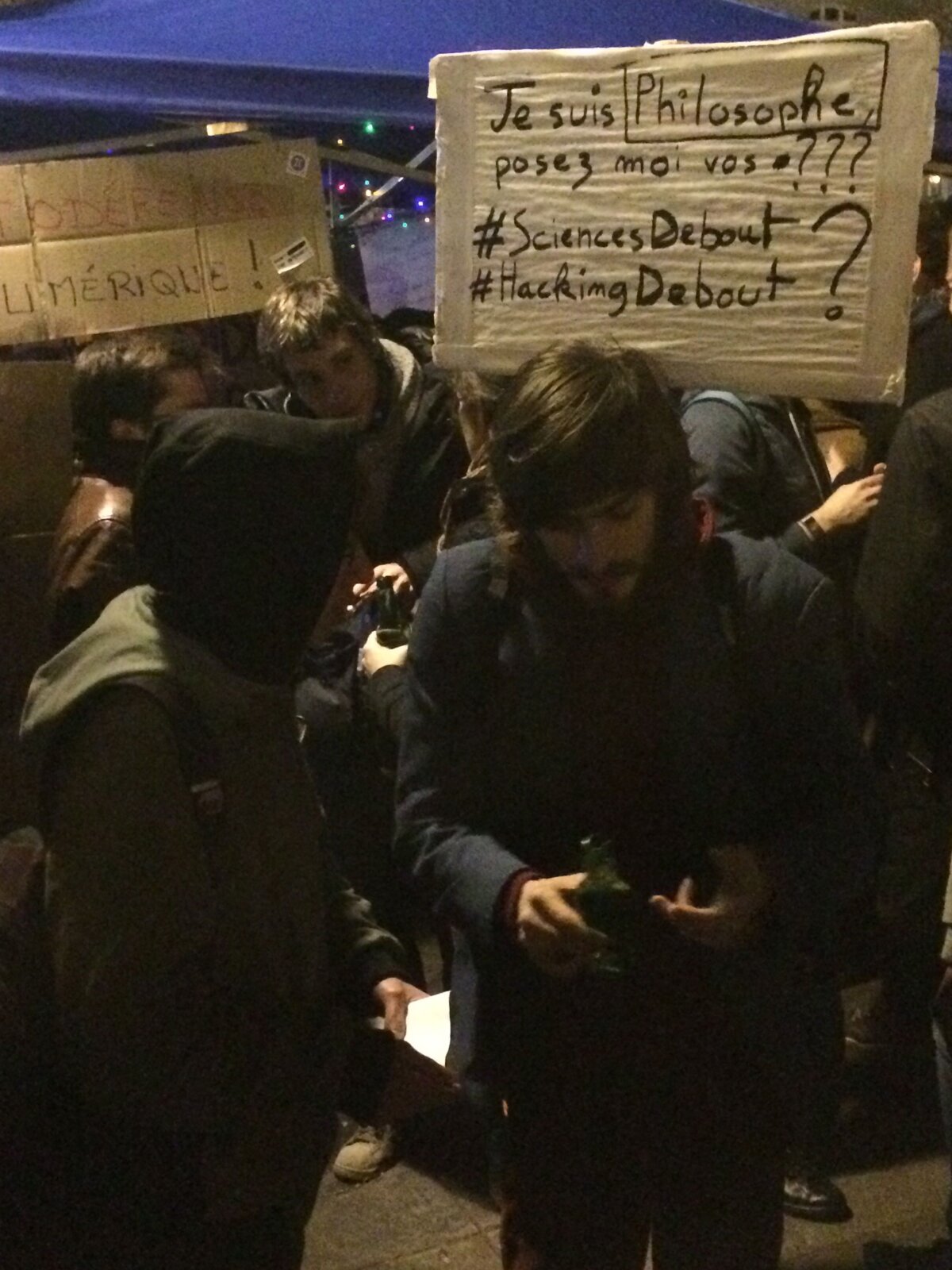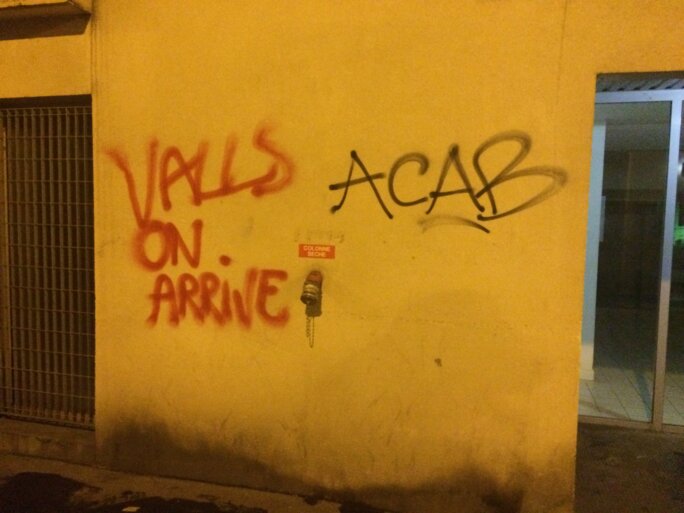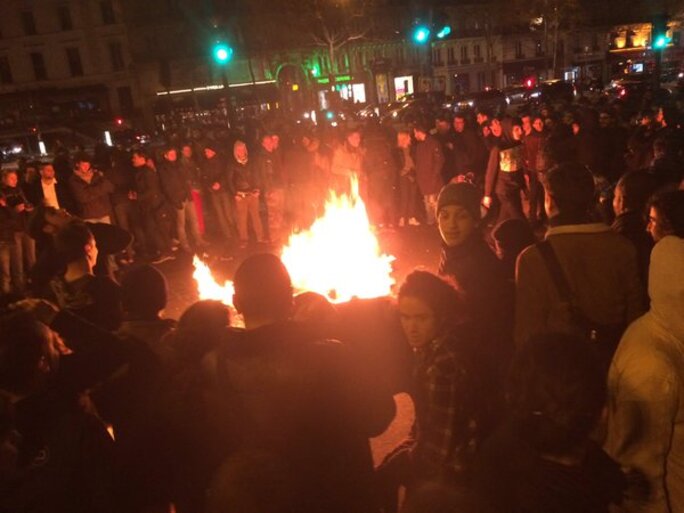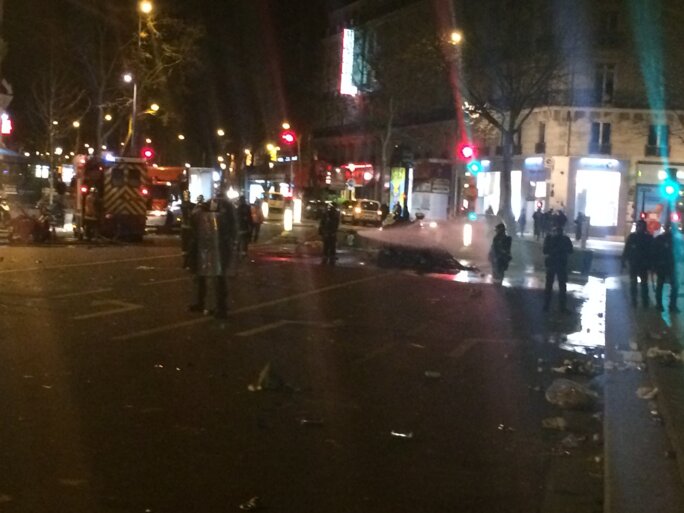Demonstrators again took to the streets of Paris on Saturday to protest against the socialist government’s proposed changes to the country’s labour laws, which are denounced by trades and student unions as a regressive move that erodes employees’ rights and protection.
The anti-labour law demonstrations have been growing in numbers since last month, and it was after one such march on March 31st that a group of several hundred demonstrators set up an improvised camp at the Place de la République in central Paris. There they gathered together, under pounding rain, to debate and plant a flag of political protest and frustration. It was the launch of the Nuit Debout movement of nocturnal sit-ins. They returned the following night, and every night ever since, their numbers growing to the one-thousand mark and beyond. There are now Nuit Debout events in a handful of other French towns and cities, notably including Lyon and Toulouse.
This Saturday’s protest march in Paris was expected to swell the numbers at the Place de la République when the demonstration ended in the early evening. In the event, that was not the case, but that did little to dim the Nuit Debout that once again saw thousands of anti-system sympathisers and the plain curious mix together to discuss and debate as the nightly General Assembly got underway. This was the night as it unfolded:
8 p.m.: A major event waspromised for 8 p.m. on the dot, but at the centre stage of the sit-in there’s nothing being announced. Filling the gap, French economist Frédéric Lordon addresses the crowd. Lordon, a member of the left-wing ‘Economistes Atterrés’ (Appalled economists) group, and a director of research with the French National Scientific Research Centre (CNRS), has been present at the Place de la République gatherings since the first Nuit Debout. “It’s necessary to remember what threw us into the streets in the first place,” he says, “it’s the El Khomri[labour]law[reform].” Lordon speaks to a crowd that is won over in advance, and, somewhat at home now on the sprawling Paris square, he goes over the two minutes that each speaker is allowed. “Let’s block everything so that everything unblocks,” he continues. He argues that a general strike is “the condition for an overthrow” although the move cannot be made “by snapping fingers”.
9.20 p.m.: At one end of the Place de la République a rap group from the northern 18th arrondissement of Paris, Les Tontons flingueurs, are stirring a 100-strong crowd.
10 p.m.: A self-service library was set up on the square earlier in the day by Lionel, 39, who manages a library in the suburb of Nanterre, west of Paris. He says he did so because of the increasing commercial outlets trading wares at the scene. “There are more and more hotdog and T-shirt sellers,” he said. Later into the night, men wearing advert boards front and back were weaving through the crowds handing out Granola cakes. “So I felt the need to offer something non-commercial,” continues Lionel, who took inspiration for the library from the Occupy Wall Street “People’s Library”, and which became a centre of exchange for more than 5,000 books.
He made an appeal on the internet for help in setting up the project. “Even publishers like La Découverte and L’Échappée belle gave me boxes of books,” he says. “We set up a pirate box to share e-books.”
The working principal for the library is that for every book that someone brings they can take another out. All day long, people arrived with books. “Lots of [best-selling writers] Marc Levy and Lorànt Deutsch,but also lots of [French thinker] Pierre Bourdieu, books on the French Revolution, works on economics,” Lionel explained. He spoke of the encounters through the day. Aman in a wheelchair came with a friend to hand over three boxes of books. “We had quite a bit of a chat,” said Lionel. “Because he’s in a wheelchair its difficult for him to stay very long [so] he found a means of making himself useful and to fight against the labour law which he finds profoundly unjust.”

Enlargement : Illustration 1

10.30 p.m. A young man, who looks about 25 at the oldest, takes up position beside a mobile canteen. Above his head is a placard reading: “I’m a philosopher. Ask me your questions. #sciencesdebout. ” Two medical students test him out. “We’ve got a question,” says one. “What’s going on here?” The question sounds dumb, but is highly pertinent. The “philosopher” thinks for a few seconds and then shows his irritation. “Well, I don’t know, you just have to look around you,” he replies. Another passer-by helps him out with another question. “Can one eat animals?” he asks. “Why ban human meat and not animal meat?” A group of about eight people stop and listen to the debate before moving on for more discussion elsewhere.
Around 10.30 p.m.: The official General Assembly meeting begins and a young woman is the first to address the crowd. She calls for a march to the home of Prime Minister Manuel Valls, in the nearby rue Keller in the 11th arrondissement. As soon as she finishes, there are shouts of “Aperitive Valls!”. A small group of people come together and start walking around the square, gathering in size to about 100. The spontaneous march sets off along the boulevard Beaumarchais but find themselves blocked by a hurriedly-formed cordon of riot police. The unauthorized march returns to the square and heads off again, this time down the avenue de la République. With no riot police in view, the marching demonstration gets underway, followed by about several hundred people. It would finally end two hours later.

Enlargement : Illustration 2

11 p.m.: Olivier, Clara and William wrap-up their equipment. That morning they set up a new internet-based radio station for the Nuit Debout movement, called libre@toi. All three are former staff of radio station Ici et maintenant! who resigned to set up an association together. They look happy to have come to the sit-in, although they appear to find it difficult to fit in. “We needed a power generator. We had to make contact with X, who sent us back to Y, but in fact it was Z, who was in a meeting. The people who are organizing the revolution have already fallen into the mire of bureaucracy.”
11.30p.m.: At the canteen stand, people pay what they want for their meal. The young adults running the facility already have some experience with the practice, having set up a mobile street shop in the south-east Paris suburb of Ivry-sur-Seine, providing food collected twice a week from wasted produce at the wholesale food market at Rungis. “We began militating with projects linked to housing issues,” explains one of the canteen organizers. “That led us to realize how many families live on the streets. Which is from where the idea came to offer them fresh produce every Wednesday. There are about forty people, above all mothers, who come to provision themselves with us.” One of the volunteers is a technician who works on installing fibre optic cables on building sites. Another is an anthropology student preparing a doctorate. The third is a secondary school official. They are all aged between 27 and 30.
They had a surprise boost for their activities when an Iranian woman handed over a 500-euro banknote for her meal at the Place de la République.
Around 11.30 p.m.: The principal police station for the 11th arrondissement, situated on the corner of the avenue Ledru-Rollin and the Charles-Dallery passage, is the target of a fierce attack. Used-bottle banks in the streets are overturned and the few dozen assailants throw glass projectiles at the windows of the building. The police push them back with bursts of tear gas grenades, sending them up the rue de la Roquette.
11. 55 p.m.: The some 200 demonstrators who earlier set off from the Place de la République for the home of the French prime minister on the rue Keller are blocked rue de la Roquette, surrounded by riot police. Suddenly, the flank of riot police blocking a road leading to the Place Voltaire change position, leaving the access free. Tension mounts between the crowd and police who use tear gas to move the group away. Shortly after, a few metres away, the economist Frédéric Lordon struggles to catch his breath, his eyes stinging, but his smile intact.
0.30 a.m.: A group of four people break into song, mostly the works of Boris Vian and Georges Brassens. They say they have no time to talk to journalists. Close by, at the improvised reception to the sit in, people who offer their help line up and leave their contact details. One is a lawyer. An actor, who describes himself as a former plumber, says he is ready to help with “anything”. He is told that there is above all need of support with the medical facility, the canteen and logistics. He wants to help with the organization of the General Assemblies. “People have a need to unite together,” he says, “and here, everyone can speak out, a homeless person or an immigrant, they are listened to.” Every day, new “commissions” are created. The latest is the “love commission”, where no doubt the debates will be hot.
0.45 a.m.: The demonstration that had headed off to visit PM Manuel Valls two hours earlier has returned to the place de la République. On its journey home, several dozen autonomies who had grafted themselves to the march attacked the windows of banks and insurance agencies along the boulevard Voltaire. They are followed by a group of police, who do not intervene.

Enlargement : Illustration 3

1. 20 a.m.: The demonstrators set fire to a pile of wooden crates. Someone climbs the lampposts that surround the square to paint spray over the CCTV cameras, one after the other.
2. 35 a.m.: Since a little more than one hour, the square has taken on a different face to that of the long debates about democracy and the convergence of struggles. One of the Nuit Debout security team is overwhelmed. “There, clearly, nothing is under control,” he complains. “There were guys who came to take away our crates to use on a fire, telling us we’re social traitors. And, of course, there is no-one left around from the organisation to try and control that.” Hundreds of people flag down cars and tell drivers to do a U-turn. Fires are lit around the square while a techno beat crackles out of speakers.

Enlargement : Illustration 4

4.05 a.m.: An arson attack on a car from the fleet of electric short-term hire vehicles, Autolib’, sets off the police charge. The riot police move into the square, on the southern side with the rue du Temple. But there is no face off, just a disorganized intervention. The clients on nearby café terraces are invited to move indoors or leave, while those remaining on the square run in all directions. On Sunday, the Paris police prefecture said eight arrests had been made overnight.
-------------------------
- The French version of this article can be found here.
English version by Graham Tearse


